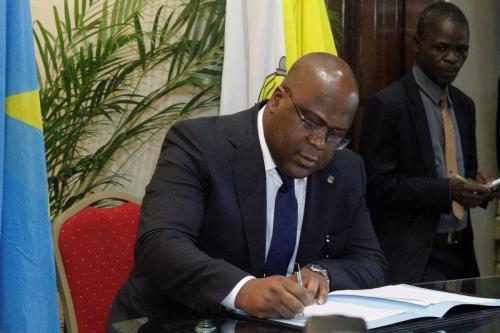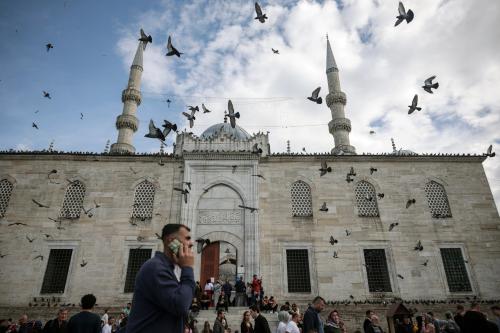

12:00 am AST - 1:00 am AST
Past Event
Content from the Brookings Doha Center is now archived. In September 2021, after 14 years of impactful partnership, Brookings and the Brookings Doha Center announced that they were ending their affiliation. The Brookings Doha Center is now the Middle East Council on Global Affairs, a separate public policy institution based in Qatar.
The Brookings Doha Center (BDC) hosted a webinar discussion on May 20, 2020 on what Islamic texts say about adjusting religious practices in the face of a pandemic. In addition to Islamic law, panelists considered the question of who holds religious authority in the Arab world and described the measures that have been enacted by states and Muslim communities. The panel consisted of a group of distinguished scholars and experts, including: Mohammad Fadel, associate professor of law at the University of Toronto; Bader Al-Saif, an assistant professor of history at Kuwait University; and H.A. Hellyer, a nonresident scholar at the Carnegie Endowment for International Peace. Geneive Abdo, a visiting fellow at the BDC, moderated the event.
Mohammad Fadel began the discussion, speaking about whether there exists a statute or precedent in Islamic law that prohibits acts of worship to maintain public health. He stated outright that there are no explicit rulings that govern religious behavior during a pandemic. However, at the individual level, Muslims are exempt from fulfilling certain obligations in specific cases. For instance, sick persons do not have to fast during Ramadan and can make up their days later. Specifically, the term “al-rukhsa” refers to all obligations that can be relaxed for those who are ill. Today, as many question the legality of suspending Friday prayers at the mosque and other religious duties, al-rukhsa supports the idea that extraneous circumstances may deem certain acts of worship optional. Furthermore, Fadel noted that contagion has been a contentious subject among Muslims throughout history. The professor stated that “It is forbidden to believe that natural factors have causative actions in and of themselves,” and this has led some to deny the medical phenomenon altogether. Finally, he recommended that Saudi Arabia still facilitate the Hajj, although with fewer people to ensure physical distancing. This will allow the special event to proceed even if at limited capacity.
Bader Al-Saif continued the discussion and described the restrictions on religious practice that have been imposed across the Gulf. Firstly, he raised the question of who holds religious authority? While many academics believe that such authority comes from the state, this is not always the case. At this political moment, Gulf states do happen to be more powerful than their religious institutions. However, this is because the former have greater funding and human resources, also, they exercise considerable authority over Islamic bodies in the name of countering extremism. Across the Gulf, states have decided upon religious restrictions and Al-Saif explains the commonalities between each country’s response. Firstly, both Saudi Arabia and Bahrain displayed leniency as they each opened one or two mosques at limited capacity. In contrast, Kuwait and Oman have locked down all mosques and strengthened social distancing measures. Qatar has adopted a policy that falls somewhere in the middle. On the one hand, it has allowed the state mosque to remain open. On the other hand, it has increased social distancing measures. Finally, Al-Saif refuted the presence of sectarian-based policies in the Gulf. Although some have claimed that the virus spread through the region from Iran, no state has adopted this discourse officially.
H.A. Hellyer spoke about Muslim communities in the West, their response to the pandemic, and religious authority in the Middle East and North Africa (MENA) region. Firstly, Hellyer noted that Western Islamic communities, especially those in the U.K., were quick to suspend communal prayers. Such communities paid heed to medical advice and acted before their governments had even enforced social distancing measures. This is understandable, Islamic communities are a minority in the West and so many maintain a distant relationship with their state. Hellyer also mentioned that there were some individuals in Europe and North America that wanted to hold virtual prayers. However, this idea failed to garner adequate support. Furthermore, the scholar then discussed religious authority in the MENA region and echoed Al-Saif in his claim that the state holds greater power. For instance, in Egypt, the al-Azhar Senior Scholars Council issued a fatwa stating that the government could close mosques if it wished to do so. Notably, the body did not oblige the state to act because it did not feel it had the authority.
The subsequent question and answer session focused on the role of technology and prospects for the future. Fadel stated that technology will not act as a panacea that allows communal worship to continue everywhere because Muslim communities across the world vary in their digital capacity. Al-Saif noted that the Gulf has embraced technological platforms and that states such as Kuwait and Saudi Arabia are developing religious applications. Moreover, panelists spoke on their predictions for the future. Fadel contended that citizens will not oppose restrictions on religious gatherings so long as they are commensurate with measures placed on other public spaces. However, Hellyer argued that mosques are a unique public space that cannot be compared to schools or commercial centers. The scholar also stated that mosques might have to respect physical distancing for some time and that the pandemic’s impact on how religious rituals are performed will persist after restrictions are eased.

Ithiel Batumike, Fred Bauma, Jason Stearns
November 4, 2025

Sharan Grewal
April 2, 2025

Aleksandr Kuzmenchuk, Constantino Xavier
March 12, 2025